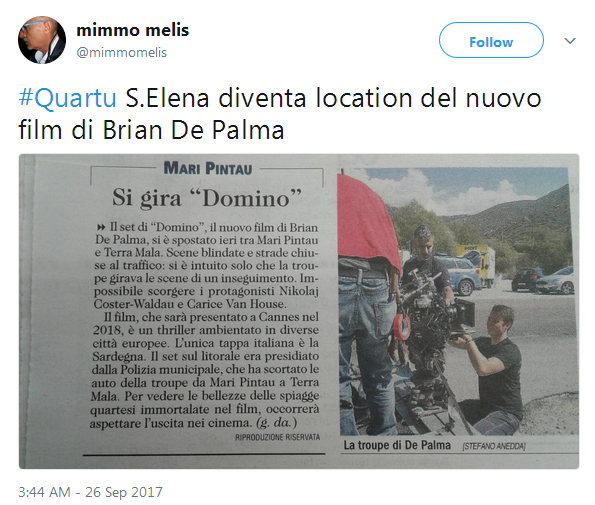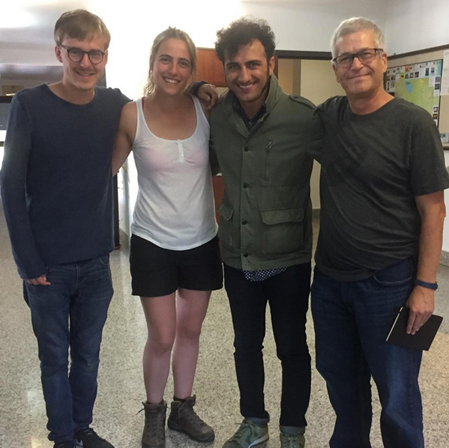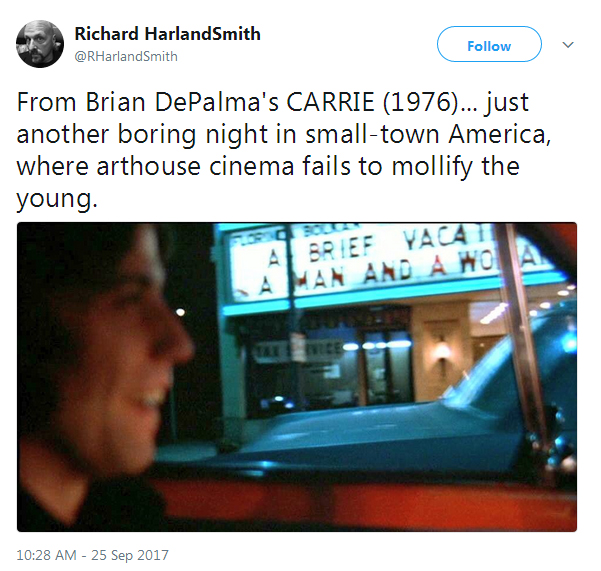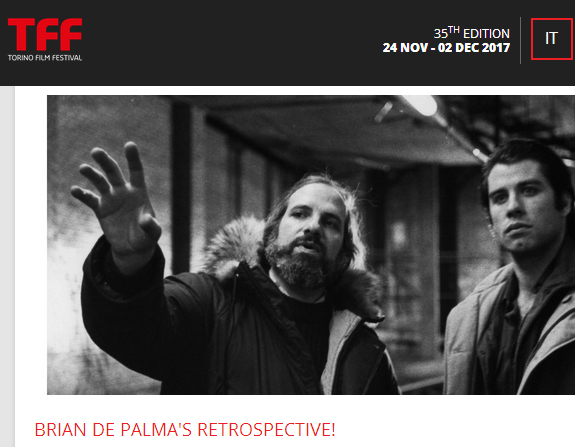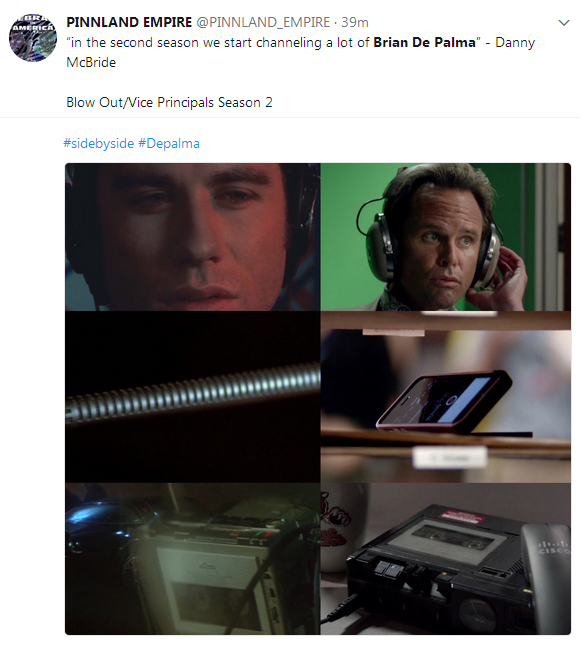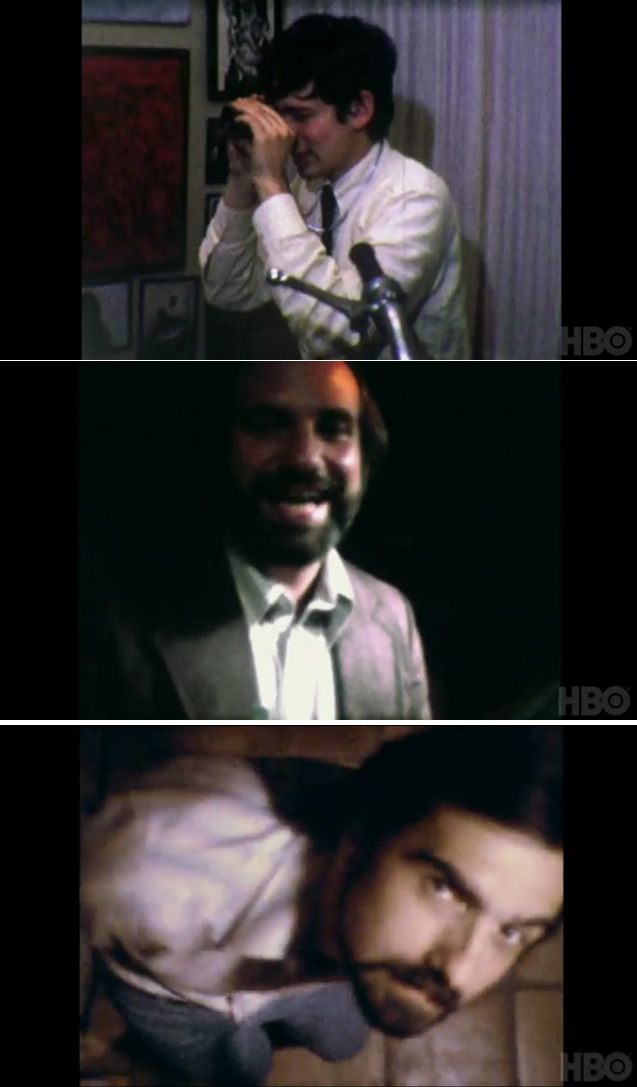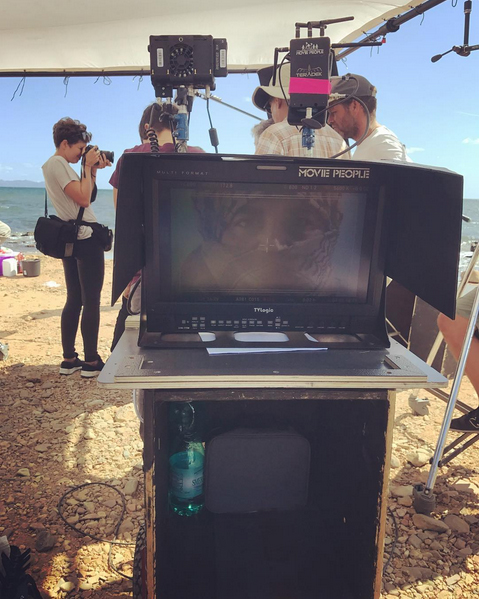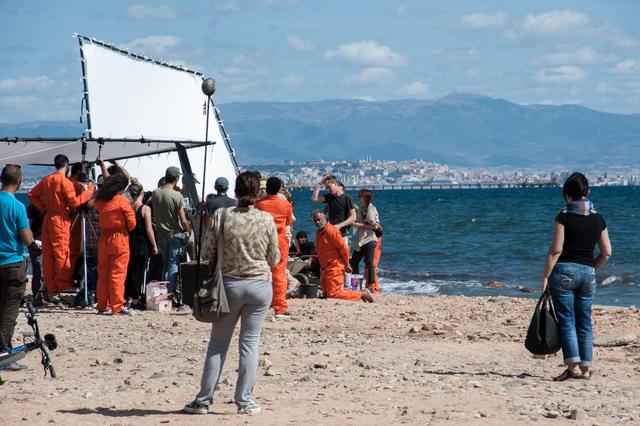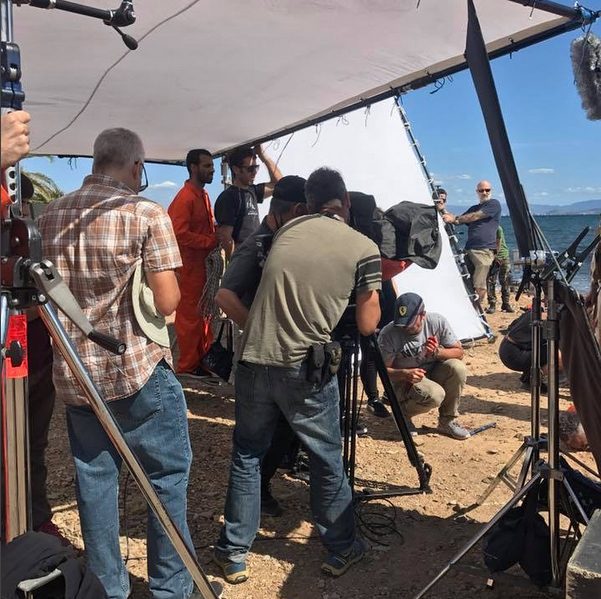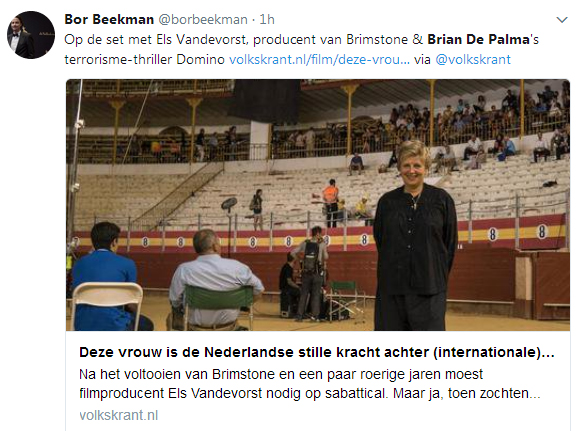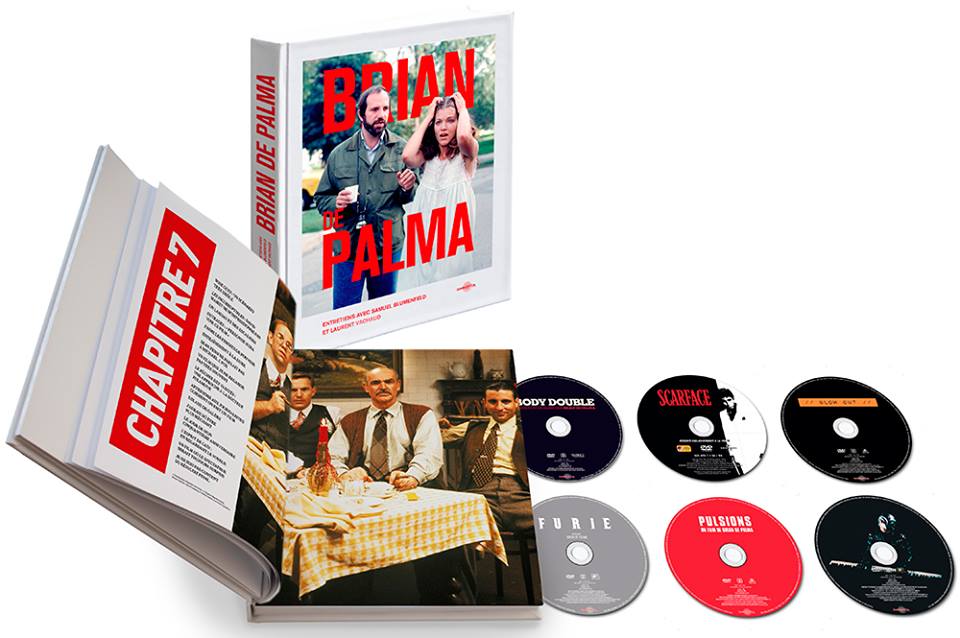This woman is the Dutch silent force behind (international) top films
The Unbreakable Vandevorst After the completion of Brimstone and a few agile years, film producer Els Vandevorst needed to take sabattical. But yes, they were looking for a crisis manager on the set of Brian De Palma.
By: Bor Beekman September 20, 2017, 19:30
In the crest of the bullfighting arena of Almería, Spain, the film hairdresser's scissor moves over the skull of director Brian De Palma. White-gray picks of hair flutter between the wooden benches of the 19th century plaza de toros. It's just a break, a little after one o'clock at night. So why not? The 77-year-old American - loose-fitting shirt, shorts even wider - blank stares ahead. In 15 minutes, the shooting of his new feature film will continue.
Co-producer Els Vandevorst is in the stand, 2 meters behind the maker of Scarface (1983) and The Untouchables (1987). Leaning forward, the cross on a chain around her neck dangles freely. "That's not bad," she says, eyes focused on De Palma's cut. "I do not know the man, anymore. But I see this as a good sign. He feels comfortable.”
It is day 28 of the shoot on Domino, a thriller about two police detectives (played by Game of Thrones colleagues Nikolaj Coster-Waldau and Carice van Houten) and their hunt for a terrorist cell across Europe: Denmark, The Netherlands, Belgium, Spain.
One of the sections of the arena is packed with about two hundred dedicated extras from the southern Spanish city. There cameramen running around, stuntmen, actors, security guards. Whether De Palma's Dutch coproducer noticed any of all that this evening is the question; The Danish-Dutch-Belgian-Spanish-Italian Domino has six producers. Nevertheless, the 55-year-old Dutch was of vital importance to De Palma's film.
Ploep, goes her phone: text message from the French equity partner. The main financier, who has not been in contact with the Danish executive producer for two weeks and called for a halt on the cash flow needed for filming. Since that day, the disgruntled French party who had been appointed "mediator" no longer calls Vandevorst. "It's not convenient, no," she says. In English she sounds of Brabant descent. She arrived late on the Domino producer team, as a kind of crisis manager.
'Balls of Steel'
So there is hassle. That's not so surprising. Hit the books about the creation of several memorable films: it's always a fuss. But sometimes there is more hassle. Perhaps this is because main protagonist Christina Hendricks (Joan from Mad Men) dropped out very late. And because the profile of the initially Norwegian-directed thriller changed when De Palma was snared: such a renowned American director comes with some demands and has his own view of the European locations, with all the consequences already agreed upon for local funding.
In addition, the emotional video message from Belgian actor Mourade Zeguendi, who said with pain in his heart, that he had to refuse an offer from De Palma because he did not want to play a Molenbeek terrorist: "I have my belly full of this type of typecasting.”
Finally. They are filming, production is over halfway through. And the French version of Vandevorst has just brought good news: some money has been transferred again. Nothing to the Spanish producer, who has already made all kinds of charges and is struggling with an art director to pay, who threatens to quit his job at any moment. But to Vandevorst, who also has her expenses, including the salaries of her actors: Van Houten and her friend Guy Pearce, in a supporting role. At the bottom of the arena, on the sand of the plaza, she immediately promises to transfer to the bank account of the Spanish producer. They have known each other for twenty years, [from the subject]. The Spaniard's face cloaks something. For the time being, Domino can continue.
"There's nobody like Els," assures the experienced Spanish producer during a producer lunch at sea, prior to night shots. "She has balls. That sounds like a macho comment, but it's true." He treats - his location, his honor - and holds a hymn on the prawns, picked out of the sea. Vandevorst is currently trying to call the French financiers. "Put that phone away," summons the Spaniard. "Look, there is the Méditerranée."
Martin Koolhoven made her world-famous in Venice in 2016, when he praised his producer during the international press conference of Brimstone. Why Brimstone producer needed 'balls of steel', then read the headline of an article in the British film magazine Screen Daily. That message needs a nuance: on and around the set, Vandevorst operates strikingly softly, amicably. She just doesn’t buckle under pressure.
Five days before the first recordings of the western, Mia Wasikowska and co-star Robert Pattinson suddenly dropped out of production. Contracts were not yet final, which was related to the complex financing structure: Brimstone's budget was culled through a chain of diverse cash flows. There were already studios booked, sets built, crews on the way. By postponing, the film would have been a bust, leading to a bankruptcy of N279 Entertainment, Vandevorst and Koolhoven's company.
It turned out differently: after 48 hours of bargaining with half of Los Angeles, agreements were reached with stars Dakota Fanning and Kit Harington, or "Jon Snow" from Game of Thrones. In between, Vandevorst gathered the grievance of troubled financiers.
Vandevorst: "When Brimstone went through a crisis, the people said: Els does not know how hot it is. I did, but if I'm going to be nervous, everyone will be nervous. But yes, they were of course."
"We also lost money because those actors walked away," says Vandevorst. "Then you end up in discussions with financiers: whether Dakota was no less than Mia Wasikowska? I thought that was unacceptable, I could also refute. Then count your relationships, what have you built up? There I always spend a lot of time: the personal. But your negotiating position is difficult at such a moment: you have to run, and that's what the financiers know. What I do not understand well about myself is that I actually became even more powerful. We'll do it, or you're just watching it. "
The battle for Brimstone continued, even after shooting. Three weeks before the world premiere at the Venice Film Festival, where the 148-minute film was selected for the main competition, the British Finance Party demanded 30 minutes be cut. "Contractually they could oblige us to deliver a 130-minute movie. So we do not get sold to America, they said. Martin was excited: they wanted to cut into his movie! But I had final cut: in the worst case, 18 minutes had to be done, but we were allowed to decide. I could play that hard and they demanded their claim. In the end, Brimstone sold very well in America without cutting a centimeter."
Vandevorst went to Asia, when Brimstone finally did not have a chance after the early attention of the Dutch release. All alone, on sabbatical. "Then I only felt how it was with me. Well, that was not so good. I do not have to do this again, I thought. "
The plan: once she returned home, she would just keep quiet aaround the office for half a year, not immediately throwing a new movie. And when she was in Indonesia, the people from Domino called. She had survived Brimstone, right? Then she could do this, too. "I knew I was not all right, but yes, De Palma. Money does not interest me. Prestige, it will be. This is a step to a higher plan."
Film closed
How do you end up in the film world? Sometimes it's a friend of a sister's sister, who is looking for an assistant for his student movie, preferably someone with a car. It had Vandevorst: 'Peugeot 204. Went three and a half years in.' At her 16th she had run away from Helmond, without middle school diploma. Father was entrepreneur and car buyer, a good one: "As a child, I saw how he did, how quickly he knew when somebody entered the business: this guy can I sell a car and not that one." Film, after a fast-paced career as a microbiologist. During her introduction to the Film Academy she met Mike van Diem, who was one year higher. "He did not speak to me, but on the return trip I said to him, "I want you to produce my final film." He still said nothing. Mike turned around, finished. That's the way he was.”
Their film, Alaska, won the student Oscar in 1990. After the academy she met at a festival Peter Aalbæk Jensen, the big man of the Danish film company Zentropa. He said, "The next time you have to be in Denmark, call me and we'll have coffee." I never had to be there, so I just went and called him up." Vandevorst worked for years as a co-producer of international films by Danish directors, such as Thomas Vinterberg's It's All About Love (2003) and Lars von Trier's Dancer in the Dark (2000) and Dogville (2003).
She also went almost bankrupt. 'A Belgian producer had hired me. In good faith, I provided him with money as he made that money and the return flow." She raised her office, sensing what was going to be remedied, did not produce movies for three unfortunate years, then scratched slowly. "I had no income. From the then Film Fund, the message came: We're done with you, you're never gonna make a movie again. I thought, well, if I stop producing myself, I decide."
Now, more than twelve years later, she is almost out of debt. Meanwhile, she produced again: titles like War Winter (2008) by Koolhoven and Above, It Is Quiet (2013) by Nanouk Leopold. Internationally acclaimed, well-visited Dutch films. Her current film company is named after a strip of asphalt: the provincial road N279, across North Brabant and Limburg. "That's what Martin thought about," says Vandevorst. "Many accidents occurred on that road, I heard later."
What she likes "very well" at Koolhoven, is his clear view of their division of work. "He's even angry when someone calls him a producer. He is authoritative director. We make all decisions about our company together. It's a kind of marriage. We can fight very well. We rarely do it. "
So Vandevorst Koolhoven talked about it, as he continued to watch all kinds of other film plans besides his dreamwestern. "I said, now you're doing everything, concentrating on what you really want in the next few years." Now the N279 companions flirt with a project in London, something with a well-known actress who wants to go to sea with them. Koolhoven also writes a period film produced by Vandevorst and N279, which takes place in Dutch-India in the late forties.
"I'd like to be there from the outset, as an initiating producer. But you'll never see me on the set next to the camera and say, I think it's different. Zero chance. '
'Scream!', calls De Palma, 'Scream it out!'. The director, pacing stiffly through the arena, waves firmly to the actors high in the gallery. 'Allahu-akbar!', a moment later. Followed by a shot. While the stuntman is rehearsing in his newest shirt full of fake blood, Vandevorst speaks quickly with Carice van Houten. "I have to take care of something," she apologizes, as an assistant accompanies her. She appears at the top of the arena, where a Flemish stuntman shows the actor the best way to kick an attacker in the crotch.
Shortly afterwards, in a restaurant, the producers draw the final contract presented by Vandevorst with the revenue distribution key. There you have to drink a bottle of Cristal, the Spanish producer knowing that his frustration about the despicable payments camouflages with happy anecdotes about his nights with Bernardo Bertolucci, who acknowledged in this restaurant that the Jamon Ibérico de Bellota they serve is really better than any ham from Italy. The Dutch production branch, which is the turn to pay, finds the 1,200 euro for a bottle of Cristal which is pricey: then rather Bollinger champagne, the James Bond brand. Spain agrees.
Once everything is signed, Italian producers fall into arms until one of them finds a wrong clause. Adjusted, Vandevorst sustains.
The next morning, in the hotel lobby: again a small crisis. With Spain, also a little with Italy. And the French, of course. It's about money again. "But with the movie, it's all right," says Vandevorst, with an encouraging look at the pale Danish head producer. "With the movie going well," repeats.
A month later, Vandevorst is sitting on a terrace in Venice. She has linked composer Pino Donaggio to Domino, the composer who provided not only many of De Palma's (Carrie, Dressed to Kill, Blow Out) music, but also the Koolhovens War Winter. De Palma is happy, of course. There are also people less happy because the filming is still not completed: the final days of shooting are being moved from Spain to Italy.
Koolhoven calls with news from the Netherlands. "We have nine nominations?", calls Vandevorst. 'Which one then?' Also the Golden Calf for Best Film, the prize being awarded to the producers. It is her fourth nomination in this category; she’s never won. "I'm still standing there," she says, gesturing to the red carpet, where the Brimstone baptism occurred a year earlier. "You have to enjoy, everyone said. But I was still in the shit with that finish, the sales agent, the money, the 30 minutes that should or may not be. I thought, how then?"
Now she is going to do everything else. "I'm going to be in full regalia in Utrecht at the Kalverengala. I really want to see that."
Two counts later: "Well, if you can work."
The Golden Kalveren ceremony is 29/9, right after the last shooting days of Domino.
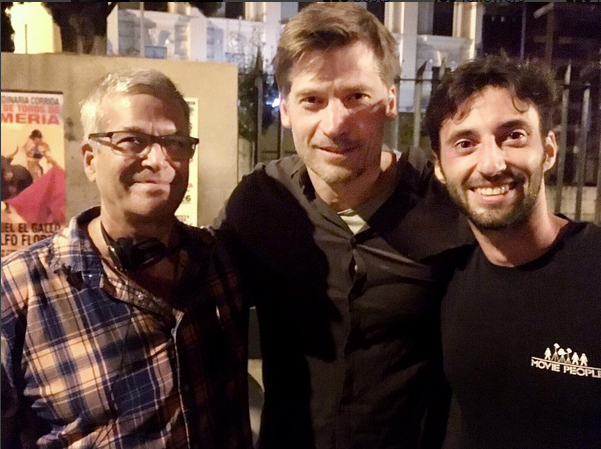
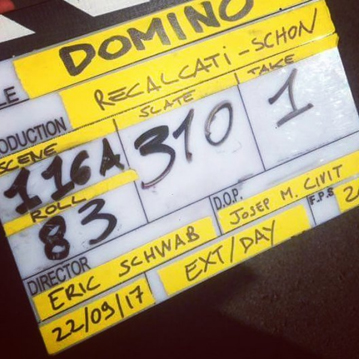 The above picture was posted to Instagram by steadicam operator Lucarelli Simone, who is on the far right, along with second unit director (and longtime Brian De Palma collaborator) Eric Schwab and Nikolaj Coster-Waldau.
The above picture was posted to Instagram by steadicam operator Lucarelli Simone, who is on the far right, along with second unit director (and longtime Brian De Palma collaborator) Eric Schwab and Nikolaj Coster-Waldau.